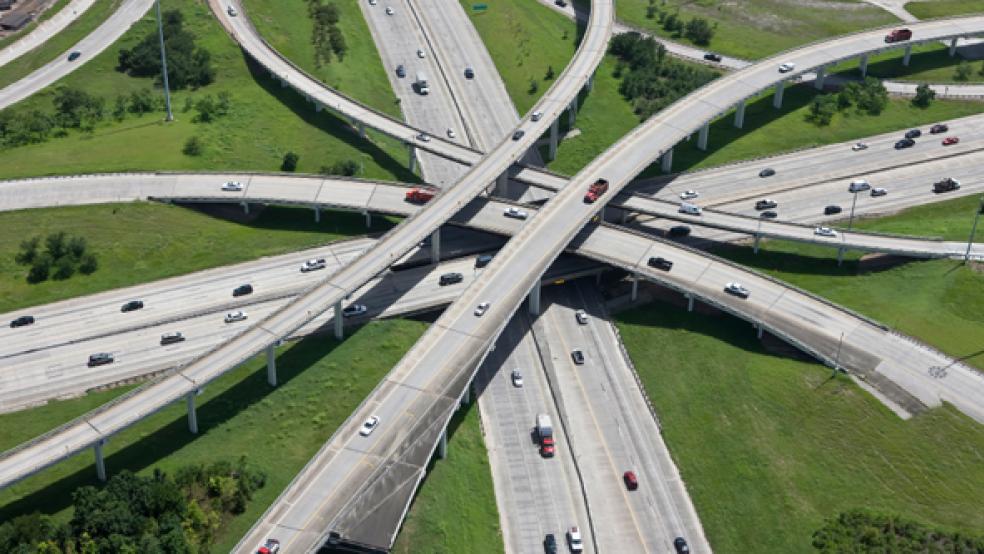For years, Congress and the administration have played a budgetary shell game to try to prop up the federal highway trust fund that finances the maintenance and rebuilding of an aging U.S. transportation infrastructure.
The federal government spends about $50 billion annually on surface transportation programs that support highways, public transportation, and intercity passenger rail. Of this total, $46 billion comes from revenues generated by a federal tax of 18.4 cents per gallon on gasoline and 24.4 cents per gallon on diesel, while the rest is made up by government transfers.
Related: Obama Aide Touts Progress by Circumventing Congress
In an era when gasoline consumption is down, fuel efficiency is up and the large cohort of baby boomers is driving less, the amount of gas tax revenue flowing into the trust funds has steadily declined and failed to keep up with the cost of living. The gas tax rate hasn’t been changed since Bill Clinton was president 20 years ago. Since fiscal year 2008, Congress has had to transfer $50 billion of general fund revenues into the trust fund to prevent insolvency.
That shell game is coming to an end: Even with the latest $9.7 billion infusion of government funds, the U.S. Department of Transportation estimates the highway construction trust fund will go belly-up before the end of the year. It will spark a crisis in state government contracting and spending throughout the country and likely halt most new construction projects.
“Without action from Congress, federal spending on transportation infrastructure will grind to a halt during the heart of summer construction season,” Kevin DeGood, Director of Infrastructure Policy at the Center for American Progress, said on Wednesday. “The Highway Trust Fund, which funds highway, bridge, and public transportation projects, will become insolvent as early as this August.”
This helps to explain the importance of a key provision of the $302 billion, four-year transportation infrastructure proposal that President Obama unveiled in St. Paul, Minn., yesterday. The president’s proposal would increase highway construction funding by 22 percent a year, boost mass transit spending by nearly 70 percent annually, and provide nearly $5 billion a year for high performance and passenger rail programs.
Instead of seeking an increase in the federal gasoline tax – a political non-starter in an election year – Obama would use corporate tax reform to generate a $150 billion infusion of tax revenues into the troubled highway trust fund over a four-year period.
Related: Obama’s Big Pitch for Infrastructure Falls Short
While Obama has repeatedly pressed for major increases in infrastructure spending to boost the economy and create more jobs, this is the first time he is advocating the use of tax reform as the solution to the highway trust fund dilemma.
“Rebuilding our infrastructure is vital to business,” Obama said yesterday in Minnesota. “This is one of Congress’s major responsibilities -- helping states and cities fund new infrastructure projects. . . If Congress doesn’t finish a transportation bill by the end of the summer, we could see construction projects stop in their tracks, machines sitting idle, workers off the job.”
He said he would include his plan in a budget he submits to Congress next week that funds rebuilding of our transportation infrastructure “in a more responsible way.”
Related: Obama to Congress: Let’s See Less of Each Other
Obama first signaled his interest in this approach during his State of the Union address late last month, when he said he would push for a lower corporate tax rate while closing loopholes, thus broadening the tax base. According to a fact sheet distributed by the White House yesterday, the proposal would include “closing unfair tax loopholes, lowering tax rates and making the system more fair.”
Coincidentally, the major GOP tax reform plan released yesterday by House Ways and Means Committee Chairman Dave Camp (R-MI) would provide a $126.5 billion infusion of cash into the Highway Trust Fund between 2014 and 2023 by imposing a one-time tax on corporate profits held overseas.
Some lawmakers struggling with the highway trust fund crisis were heartened by the Obama and Camp proposals. Rep. Bill Shuster (R-PA), chairman of the House Committee on Transportation and Infrastructure,” said in a statement that Obama and Camp “have presented proposals that I hope will bring increased focus to the challenge facing the Highway Trust Fund and the importance of the federal role in our national transportation system.”
Related: Obama’s Second-Term Agenda Faces Big Chill
Others were far more skeptical, questioning the wisdom of the president trying to link the future of the federal transportation program to the dubious possibility of major tax reform in the near future.
House Speaker John Boehner (R-OH), told reporters that a bailout for the highway fund likely would be out of the question for his caucus. "Meeting with the president [Tuesday], this is one of the issues that was discussed,” he said. “We've got to find a funding mechanism to fund our infrastructure needs.”
"I wish I could report to you that we've found it, but we haven't," Boehner added.
Sen. Barbara Boxer, chair of the Senate Environment and Public Works Committee, said Obama's plan was not likely to pass Congress, according to Reuters. And the American Trucking Association said it wasn’t sure whether tax reform would provide sufficient revenue, according to Bloomberg. ATA has instead called for an increase to the federal fuel taxes.
Top Reads from The Fiscal Times:


